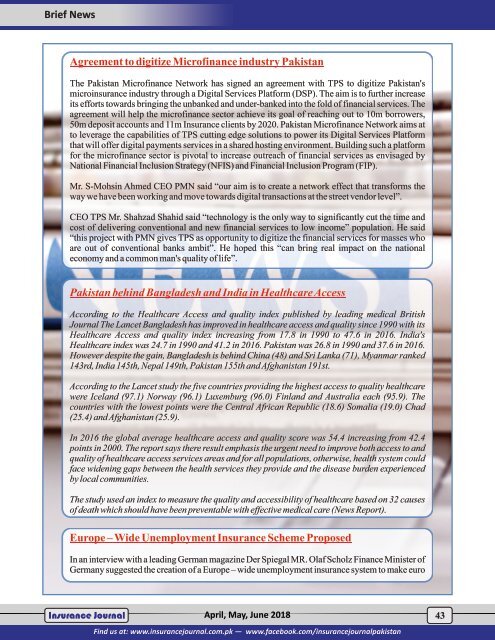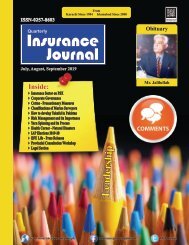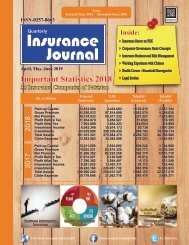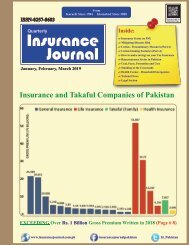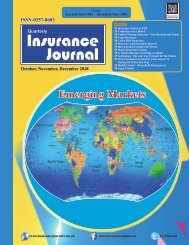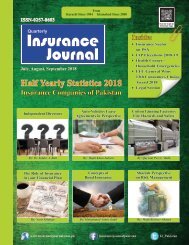Insurance Journal (2nd Quarter 2018)
You also want an ePaper? Increase the reach of your titles
YUMPU automatically turns print PDFs into web optimized ePapers that Google loves.
Brief News<br />
Agreement to digitize Microfinance industry Pakistan<br />
The Pakistan Microfinance Network has signed an agreement with TPS to digitize Pakistan's<br />
microinsurance industry through a Digital Services Platform (DSP). The aim is to further increase<br />
its efforts towards bringing the unbanked and under-banked into the fold of financial services. The<br />
agreement will help the microfinance sector achieve its goal of reaching out to 10m borrowers,<br />
50m deposit accounts and 11m <strong>Insurance</strong> clients by 2020. Pakistan Microfinance Network aims at<br />
to leverage the capabilities of TPS cutting edge solutions to power its Digital Services Platform<br />
that will offer digital payments services in a shared hosting environment. Building such a platform<br />
for the microfinance sector is pivotal to increase outreach of financial services as envisaged by<br />
National Financial Inclusion Strategy (NFIS) and Financial Inclusion Program (FIP).<br />
Mr. S-Mohsin Ahmed CEO PMN said “our aim is to create a network effect that transforms the<br />
way we have been working and move towards digital transactions at the street vendor level”.<br />
CEO TPS Mr. Shahzad Shahid said “technology is the only way to significantly cut the time and<br />
cost of delivering conventional and new financial services to low income” population. He said<br />
“this project with PMN gives TPS as opportunity to digitize the financial services for masses who<br />
are out of conventional banks ambit”. He hoped this “can bring real impact on the national<br />
economy and a common man's quality of life”.<br />
Pakistan behind Bangladesh and India in Healthcare Access<br />
According to the Healthcare Access and quality index published by leading medical British<br />
<strong>Journal</strong> The Lancet Bangladesh has improved in healthcare access and quality since 1990 with its<br />
Healthcare Access and quality index increasing from 17.8 in 1990 to 47.6 in 2016. India's<br />
Healthcare index was 24.7 in 1990 and 41.2 in 2016. Pakistan was 26.8 in 1990 and 37.6 in 2016.<br />
However despite the gain, Bangladesh is behind China (48) and Sri Lanka (71), Myanmar ranked<br />
143rd, India 145th, Nepal 149th, Pakistan 155th and Afghanistan 191st.<br />
According to the Lancet study the five countries providing the highest access to quality healthcare<br />
were Iceland (97.1) Norway (96.1) Luxemburg (96.0) Finland and Australia each (95.9). The<br />
countries with the lowest points were the Central African Republic (18.6) Somalia (19.0) Chad<br />
(25.4) and Afghanistan (25.9).<br />
In 2016 the global average healthcare access and quality score was 54.4 increasing from 42.4<br />
points in 2000. The report says there result emphasis the urgent need to improve both access to and<br />
quality of healthcare access services areas and for all populations, otherwise, health system could<br />
face widening gaps between the health services they provide and the disease burden experienced<br />
by local communities.<br />
The study used an index to measure the quality and accessibility of healthcare based on 32 causes<br />
of death which should have been preventable with effective medical care (News Report).<br />
Europe – Wide Unemployment <strong>Insurance</strong> Scheme Proposed<br />
In an interview with a leading German magazine Der Spiegal MR. Olaf Scholz Finance Minister of<br />
Germany suggested the creation of a Europe – wide unemployment insurance system to make euro<br />
<strong>Insurance</strong> <strong>Journal</strong> April, May, June <strong>2018</strong><br />
43<br />
Find us at: www.insurancejournal.com.pk — www.facebook.com/insurancejournalpakistan


